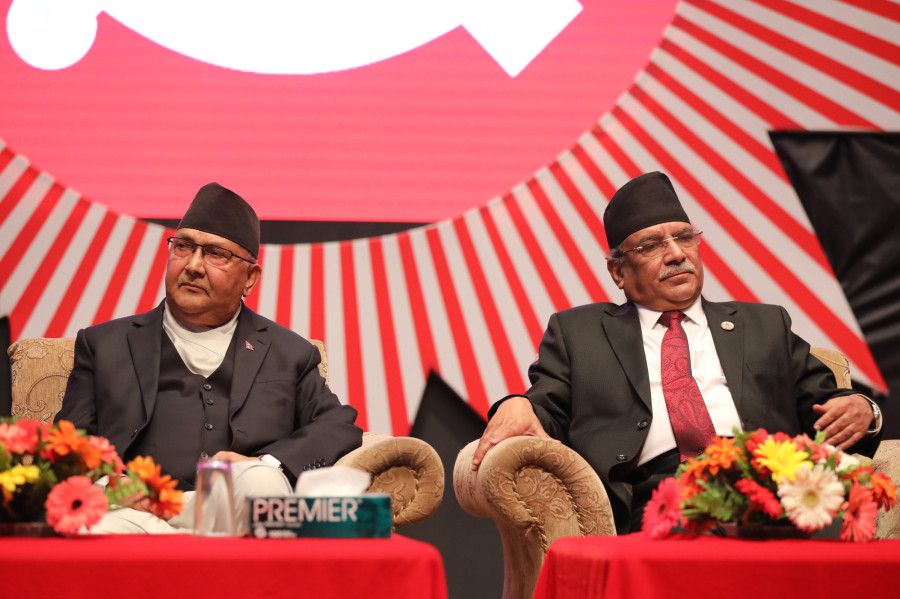Politics
Speaker post has become a matter of prestige for co-chairs, say party insiders
With both NCP chairs not giving up on their candidates for Speaker of the House, party leaders are afraid the issue could snowball.
Tika R Pradhan
As indecision in the ruling Nepal Communist Party over the candidate for the House Speaker continues, insiders say party leaders have now come to terms with the fact that the issue has become a matter of prestige for the two co-chairs.
The past week saw an uncanny silence between KP Sharma Oli and Pushpa Kamal Dahal—there was no dialogue at all, even though it had become a norm for Dahal to consult Oli on almost every issue. Oli and Dahal only met on Thursday.
But pressure on the ruling party is mounting, as it has to find an acceptable candidate for the post of Speaker. The next House meeting is scheduled for Monday, and yet another postponement, if no agreement is reached, will be the fourth since the winter session commenced on December 20.
According to insiders, the leadership is concerned that yet another deferral of the House meeting will reflect badly on the party, which is already facing criticism for holding Parliament hostage.
The ongoing conflict could snowball, if it is not addressed at the earliest, said a ruling party leader.
“After the party secretariat officially decided to make Dahal the executive chairman, it looked like the bond between him and Oli was growing stronger, and there were expectations that the remaining tasks related to unification could be completed soon,” Hemraj Bhandari, a central committee member, told the Post. “But this row over the Speaker shows that there was no growing bond.”
Though a January 11 secretariat meeting had decided to ask Deputy Speaker Shiva Maya Tumbahangphe to resign to pave the way for the party to pick its Speaker candidate, Tumbahangphe refused and staked her own claim to the post.
According to party leaders, Oli was not present at the January 11 meeting of the nine-member secretariat, where Dahal has managed to create a majority on his side.
While Tumbahangphe has the backing of President Bidya Devi Bhandari, leaders believe Oli is now also throwing his weight behind her—to counter Dahal. Former Maoist leaders believe that Tumbahangphe refused to abide by the secretariat’s order because Oli had her back.
Surendra Pandey, a Standing Committee member who represents the former CPN-UML, said the conflict between the two chairmen has reached a tipping point.
“The two leaders have made it into a big prestige issue and now no one wants to be the one to make concessions,” said Pandey.
Dahal, who had earlier maintained a flexible position on the Speaker, has hardened his stance since former Maoist leaders convinced him that losing the post to the former UML could reduce their leverage in the party.
Oli has stood in favour for Subas Nembang for Speaker while the former Maoists could agree on either Agni Sapkota or Pampha Bhusal.
The dispute could have been resolved amicably had the President not appeared on the scene, said party leaders. President Bhandari’s intervention prompted Dahal to hold a meeting on January 8 at Bamdev Gautam’s house in Bhaisepati where Dahal managed to bring Madhav Nepal, Jhala Nath Khanal and Narayan Kaji Shrestha into his fold, relegating Oli to a minority in the nine-member secretariat. Secretariat member Ram Bahadur Thapa was out of the country at the time.
“If the conflict over the Speaker continues, it could even lead to a split in the party,” said Mani Thapa, a Standing Committee member. “Since many leaders close to Nepal are also with Dahal, Oli is feeling the heat.”




 8.22°C Kathmandu
8.22°C Kathmandu















